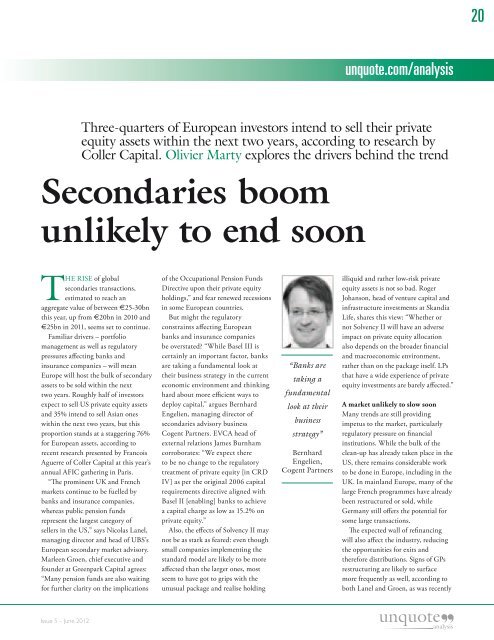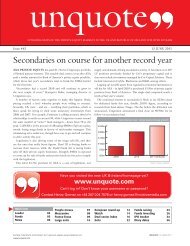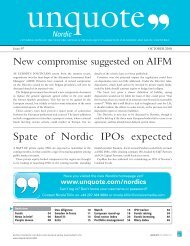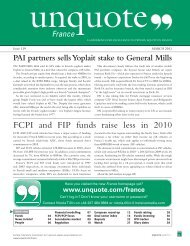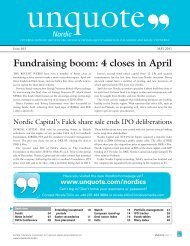Firstly, Lion Capital acquired eyewear retailer Alain Afflelou - Unquote
Firstly, Lion Capital acquired eyewear retailer Alain Afflelou - Unquote
Firstly, Lion Capital acquired eyewear retailer Alain Afflelou - Unquote
Create successful ePaper yourself
Turn your PDF publications into a flip-book with our unique Google optimized e-Paper software.
20<br />
unquote.com/analysis<br />
Three-quarters of European investors intend to sell their private<br />
equity assets within the next two years, according to research by<br />
Coller <strong>Capital</strong>. Olivier Marty explores the drivers behind the trend<br />
Secondaries boom<br />
unlikely to end soon<br />
The rise of global<br />
secondaries transactions,<br />
estimated to reach an<br />
aggregate value of between €25-30bn<br />
this year, up from €20bn in 2010 and<br />
€25bn in 2011, seems set to continue.<br />
Familiar drivers – portfolio<br />
management as well as regulatory<br />
pressures affecting banks and<br />
insurance companies – will mean<br />
Europe will host the bulk of secondary<br />
assets to be sold within the next<br />
two years. Roughly half of investors<br />
expect to sell US private equity assets<br />
and 35% intend to sell Asian ones<br />
within the next two years, but this<br />
proportion stands at a staggering 76%<br />
for European assets, according to<br />
recent research presented by Francois<br />
Aguerre of Coller <strong>Capital</strong> at this year’s<br />
annual AFIC gathering in Paris.<br />
“The prominent UK and French<br />
markets continue to be fuelled by<br />
banks and insurance companies,<br />
whereas public pension funds<br />
represent the largest category of<br />
sellers in the US,” says Nicolas Lanel,<br />
managing director and head of UBS’s<br />
European secondary market advisory.<br />
Marleen Groen, chief executive and<br />
founder at Greenpark <strong>Capital</strong> agrees:<br />
“Many pension funds are also waiting<br />
for further clarity on the implications<br />
of the Occupational Pension Funds<br />
Directive upon their private equity<br />
holdings,” and fear renewed recessions<br />
in some European countries.<br />
But might the regulatory<br />
constraints affecting European<br />
banks and insurance companies<br />
be overstated? “While Basel III is<br />
certainly an important factor, banks<br />
are taking a fundamental look at<br />
their business strategy in the current<br />
economic environment and thinking<br />
hard about more efficient ways to<br />
deploy capital,” argues Bernhard<br />
Engelien, managing director of<br />
secondaries advisory business<br />
Cogent Partners. EVCA head of<br />
external relations James Burnham<br />
corroborates: “We expect there<br />
to be no change to the regulatory<br />
treatment of private equity [in CRD<br />
IV] as per the original 2006 capital<br />
requirements directive aligned with<br />
Basel II [enabling] banks to achieve<br />
a capital charge as low as 15.2% on<br />
private equity.”<br />
Also, the effects of Solvency II may<br />
not be as stark as feared: even though<br />
small companies implementing the<br />
standard model are likely to be more<br />
affected than the larger ones, most<br />
seem to have got to grips with the<br />
unusual package and realise holding<br />
“Banks are<br />
taking a<br />
fundamental<br />
look at their<br />
business<br />
strategy”<br />
Bernhard<br />
Engelien,<br />
Cogent Partners<br />
illiquid and rather low-risk private<br />
equity assets is not so bad. Roger<br />
Johanson, head of venture capital and<br />
infrastructure investments at Skandia<br />
Life, shares this view: “Whether or<br />
not Solvency II will have an adverse<br />
impact on private equity allocation<br />
also depends on the broader financial<br />
and macroeconomic environment,<br />
rather than on the package itself. LPs<br />
that have a wide experience of private<br />
equity investments are barely affected.”<br />
A market unlikely to slow soon<br />
Many trends are still providing<br />
impetus to the market, particularly<br />
regulatory pressure on financial<br />
institutions. While the bulk of the<br />
clean-up has already taken place in the<br />
US, there remains considerable work<br />
to be done in Europe, including in the<br />
UK. In mainland Europe, many of the<br />
large French programmes have already<br />
been restructured or sold, while<br />
Germany still offers the potential for<br />
some large transactions.<br />
The expected wall of refinancing<br />
will also affect the industry, reducing<br />
the opportunities for exits and<br />
therefore distributions. Signs of GPs<br />
restructuring are likely to surface<br />
more frequently as well, according to<br />
both Lanel and Groen, as was recently<br />
Issue 5 – June 2012


